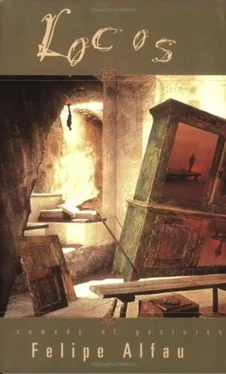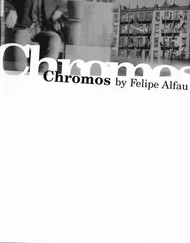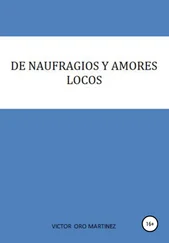When they opened the door, I broke down and cried. I don’t remember what I said except that I did not intend to study any more or that if I went back to that school I would murder a priest. I cried and cursed and for once was not reprimanded for it. My mother soothed me and told me to be calm and not to fear, that I did not have to study if I did not want to, that I was not going back to school, that I could do what I pleased and sleep as long as I washed. Then I remember her saying something about anemia and she was loving and I felt a great relief and during the days that followed I drank something bitter before meals.
Soon after that we left Vizcaitia and returned to Madrid.
As I have said, everything in those days seems foggy, my brain was in a turmoil. I was very sleepy and tired and had become too high-strung. Now I only see a great confusion and out of that maelstrom of sentiments and ideas, three strange pictures: A woman with her heart pierced by many arrows, a man on a cross, bleeding, with a crown of thorns on his head, and a still more puzzling picture with only a heart aflame. And either my childish intuition or my overwrought imagination of those days found a strange connection between those pictures and a man and a woman whose lives are bound together in my memory by a subtle romantic feeling. All fades then before the dazzling vision of a woman advancing toward me on a great white horse. then everything goes black and there are two dogs, two great big dogs, barking in the darkness.
I
My knowledge of the early youth of my friend Garcia is very limited. I know that he was born at the beginning of spring. This is, however, too coincidental a thing to have any bearing upon his case.
Nevertheless, as an infant he was known to be fond of flowers and the sign of anything pertaining to spring brought from him actions and sounds revealing a profound inner delight.
Then came a marked change. I remember him as a boy when we both attended the Colegio de los Padres Salesianos in Vizcaitia. He was pale and thin, with pimpled complexion and a strong tendency to dreaminess and melancholia. These qualities seemed to grow more intense during the spring, a thing which by contrast became more apparent to his companions as we always felt rather happy at the approach of the summer holiday. During these spells, he went about alone and did not mix or play with the other boys.
At first we attributed his attitude to worry about the coming examinations, but later I realized that it must have been due to some other cause as he studied less during those periods and appeared absent-minded and distracted in class, and consistently fell back in his marks.
Then Garcia left Vizcaitia and I did not see him again until I returned to Madrid, where I came in contact with him through mutual acquaintances. It was through these acquaintances that I learned that he wore long hair, wrote poetry and asked his friends for money. Garcia did not work and led an aimless life, a thing in which most of his friends envied him secretly. This, at least, is what I gathered from their comments.
I remember one day in a café, when a friend asked him point-blank:
“Garcia, don’t you ever feel a desire to work?”
Garcia was sipping a glass of manzanilla. He finished it without haste and answered:
“Yes, but I do my best to repress it.”
From that day my friendship with Garcia was established.
And then, one day I had the first clear glimpse into his life hobby.
We were walking in the Retiro, and I had just become positively aware of the fact that Garcia looked worn out and shabby, exaggeratedly old for his age. His hair was long and quite gray. This was in the month of May.
Garcia was telling me about some poems he was writing or was about to write.
Suddenly, he left my side and advanced ahead. He staggered forth, his head up, his arms stretched in front as if drawn by a vision, and leaned on a big tree.
When I overtook him, there was a strange glow in his face, an expression of infinite joy and happiness which surprised me, and he exclaimed as if finishing our interrupted conversation:
“It is this. it is this. ” and he caressed the tree with a gesture which included the whole scenery. “This eternal season that never fails.”
His face contrasted with the sadness of his frame. The day was lukewarm, the air was balmy and all was still. There was a feeling of expectancy. Garcia went on:
“Do you smell those flowers? Can you hear the rustle of the breeze among the foliage? Can you see the lace of light and shadow the trees weave upon the ground?”
My mind told me that all this was secondhand literature and I knew that Garcia always had a lyric way of expressing himself. But I could not rid myself of the poetry of the moment, I felt caught in a trap of sentimentalism and Garcia carried suggestion in his words and in his countenance. He spoke as if in a rapture:
“This is what makes life worth living. Life itself. ”
“Yes, El Retiro is very beautiful, it is one of the most poetic parks I have seen.” I also wanted to put in a word.
Garcia shook his hand in the air as if wiping my words off an imaginary slate:
“It is not that. it is the season, it is this season that never fails. It is this great compensation to all our troubles and disappointments. I have come to depend on nothing else.”
There was a pause.
Garcia went on: “You don’t know what this means to me. It reconciles me to life every year. It brings me the greatest happiness that I have known. It is what we all hope for, consciously or subconsciously. It is the hope of mankind. Spring means to me what it should mean to you and to everybody, but people seem to go about their business unaware of days like this. They go after petty things and then they are disappointed. They are always hoping for something they think they never can attain, and what they are hoping for is spring, the thing that never fails, the thing on which we can bank everything, the thing to which we should be ever thankful. They do not realize that it is at hand, that it comes to their aid every year. A man may be in misery, he may have no food or no place to sleep. In winter this is hard and he will fear, but then on comes the spring and he fears no more. Spring brings warmth, and fruits and flowers, it brings abundance of life, it brings us safety. But people don’t realize this, and they continue to go about with the same cheap winter-providing attitude, oblivious of this great thing that is going on, oblivious of everything important. I feel as if I were the only man who has discovered spring.”
“That sounds very nice, but. ” I was pitifully, or fortunately, failing the situation. I was taking my friend literally and Garcia, still leaning on the tree, signaled me to keep quiet.
“I know all your objections, but, man, don’t be ungrateful, spring is here. Do not desecrate the moment. Do not fool yourself; this is the only dependable thing. Everything else passes and fades, but spring always comes.”
We were silent a while. Then Garcia said:
“Excuse me,” and he embraced the tree.
II
When I left Madrid, Garcia was about to take a position he had secured through the efforts of a good friend. I felt somewhat happy at the thought of leaving Garcia with something safe and to see that he was entering the path of normality and orderly living, for I will not deny that lately I had entertained vague fears about his sanity. I was, however, soon to be disappointed by a letter I received from him which shows that his old ideas had not left him:
“There is a latent poetry in the atmosphere of something vague and distant that is preparing itself, something that is gathering strength and elements to burst forth suddenly, and it is spring, the season which I always await because it brings me happiness. I don’t know what there is in spring that I always wait for it and always depend on it as if it were a great resource that never fails. For a long time I have felt this way.
Читать дальше












